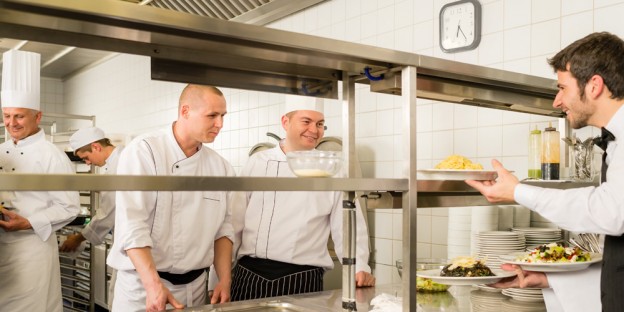Most job profiles for cruise ship chef jobs request for the candidate to be proficient with time management. This is because the volumes of guests on board require for an almost constant stream of food making the rounds.
The basics of good individual time management skills on any cruise line job include the ability to handle many tasks simultaneously, set priorities and meet deadlines. This helps each member of the kitchen staff concentrate on his/her own responsibilities while at the same time being a cog in a well-oiled machine. Teamwork clearly goes a long way in keeping the kitchens on a cruise ship running smoothly.
In scenarios where thousands of guests are involved on a daily basis, decisions at the top have a trickle-down effect. Management begin with predicting the tastes that will dominate the cruise based on the type of passengers or food trends – for example Europeans prefer lighter wines, burgers and fries are popular midnight snacks. This means stocks can be ordered and prepared accordingly.
It also helps prepare a menu, planned well in advance of setting sail so that the kitchen staff know exactly what they are doing and when. Once the stores are bought, labelled and stocked, preparation and cooking are done in a quick, efficient, timely fashion. It is no mean feat to feed around 4,000-5,000 guests each day, with up to 20,000 meals!
Today, technology helps inform the kitchen how many passengers are eating and at which of their restaurants. With this, the staff can anticipate a rush and be better prepared to dish out meals quicker. To save time, the heads of the cruise ship kitchens design simple menus, for example, serving a single type of main of meat, poultry and seafood each. Cooks can then prepare food as the orders come in to reduce wastage.
Having many different kitchens specialising in various cuisines helps cooks concentrate on few jobs better. Some cruises like the Royal Caribbean’s Oasis of the Seas have about 20 galleys, including a butcher shop. In each kitchen, work continues almost non-stop round the clock, with teams dedicated to a single job – cleaning and butchering meat, washing and cutting vegetables, making stocks, etc.
In cruise ship kitchens, being on time and efficient at work is imperative, since every minute wasted is a delayed meal.



